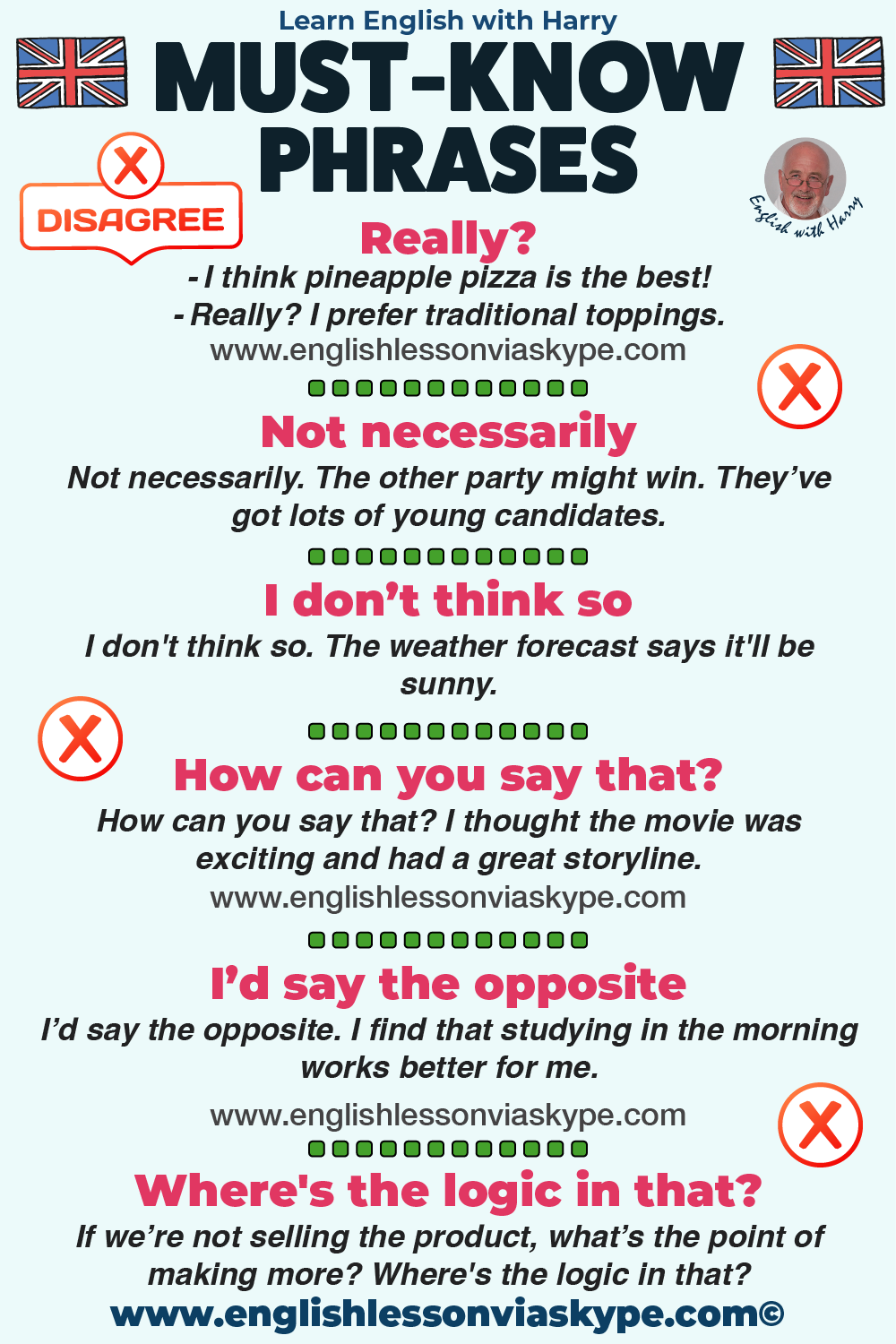How to disagree in English politely? Learn important English phrases for daily conversations. These common English phrases are useful for real-life situations when you would like to express your disagreement.
These crucial English phrases will make your English more natural and fluent, and help you sound like a native speaker. This vocabulary will help you better express yourself in English, whether engaging in a friendly chat or more formal discussions.
Listen to the podcast Speak Better English with Harry or watch it on YouTube at Learn English with Harry. englishclass101
List of English phrases
How to disagree in English politely
Harry
It’s an advanced English lesson, exploring ways and expressions to politely disagree with somebody. Of course, if we disagree, we can simply say, ‘I don’t agree’ or ‘No, I don’t agree with you. That’s rubbish’—though the latter can sometimes come across as a bit rude.
If we want to be more polite, especially with customers, bosses, or anyone we don’t wish to upset, or perhaps if you’re just a nice person who prefers not to be rude, there are ways to disagree politely.
As always, we have 10 English phrases. I’ll give them to you one by one and provide examples for you to practice.
improve english on a budget
Online English Courses from €7.99
really?
Meaning: express scepticism or question the accuracy of what the other person said
Examples:
👩🏼🦰 I think pineapple pizza is the best!
🧔🏻♂️ Really? I prefer traditional toppings.
👱🏼♂️ I think this order is in the bag. I think I’ve got it.
👨🏻🦱 Really? I think we’ve got a little bit more time to wait until we get the confirmation.
I don’t think so
Meaning: express disagreement or doubt in response to a statement or proposition
Examples:
I don’t think so. There is a lot more to this than you think.
I don’t think so. The weather forecast says it’ll be sunny.
🧑🦱 I think we’ll win the Cup quite easily. We’ve got a great team this year.
👨🏻 I don’t think so.
How to disagree in English politely

no way!
Meaning: express strong disbelief or disagreement with someone’s statement
Examples:
No way! You’ve got school tomorrow. You’re not going to any party tonight.
👩🏼🦰 I think the meeting is at 2 PM.
👨🏾🦲 No way! It’s definitely at 1 PM.
I’d say the opposite
Meaning: is used to disagree with someone by offering a contrasting viewpoint or opinion
Examples:
I’d say the opposite. I find that studying in the morning works better for me.
I’d say the opposite. The party on the left has very strange strategies. It will not be easy for them to get into power.
not necessarily
Meaning: we don’t completely agree because what someone said might not be true in every case
Examples:
Not necessarily. The other party might win. They’ve got lots of young candidates.
Not necessarily. Promotions depend on how well you do your job, not just working longer hours.
book your trial English Lesson
how can you say that?
Meaning: we use it to express disbelief or disagreement, questioning the other person’s statement or opinion
Examples:
How can you say that? I thought the movie was exciting and had a great storyline.
How can you say that? These people have lost everything. They are obviously desperate.
where’s the logic in that?
Meaning: we use it to ask why someone thinks or says something that doesn’t make sense to us
Examples:
Where’s the logic in that? It doesn’t make sense to me. I really can’t agree with you.
If we’re not selling the product, what’s the point of making more? Where’s the logic in that?
you can’t honestly believe/think that…
Meaning: we strongly disagree and find it hard to believe someone’s opinion
Examples:
You can’t honestly think that… I’ve known you for a long time. I know the sort of person you are.
You can’t honestly think that. Eating only sweets is not a healthy choice.
How to disagree in English politely

it just doesn’t make sense to me
Meaning: a polite way to say that someone’s idea is stupid
Examples:
I hear what you’re saying, but it just doesn’t make sense to me.
That seems like a lot of journeys… It just doesn’t make sense to me.
oh, that’s ridiculous
Meaning: we use it to express strong disagreement, indicating that we find the statement or idea absurd or unreasonable
Examples:
👨🏻🦱 I think the Earth is flat.
👩🏼🦰 Oh, that’s ridiculous. There’s overwhelming evidence that it’s round.
👩🏼🦱 I believe that aliens are controlling our thoughts.
👵🏼 Oh, that’s ridiculous! There’s no evidence for that claim.
Okay, so there are 10 ways to disagree in English politely. Let me give them to you one more time:
- Really?
- I don’t think so
- No way! (strong)
- I’d say the opposite.
- Not necessarily.
- How can you say that?
- Where’s the logic in that?
- You can’t honestly think that…
- It just doesn’t make sense to me
- Oh, that’s ridiculous!
So that’s the end of this particular lesson. As always, try to practice them, and try to introduce them next time when you’re having a discussion with your partner, work colleagues, or friends. Try to use one or two of these phrases when you have the opportunity to have a disagreement or to disagree with somebody.
And if you need some additional help, come back to me www.englishlessonviaskype.com. I try to give you a couple of more examples. Okay, so this is Harry wishing you a good day. Thanks for watching. Thanks for listening. Join me again soon.
speak better English with Harry podcast- episode 465
more information
For more information on English grammar rules, English collocations and English idioms, check out the links below:
You can always study English advanced level at Learning English with the BBC and British Council Learn English.






